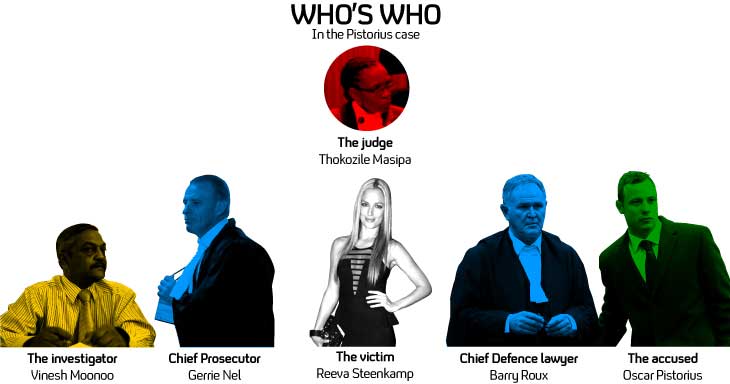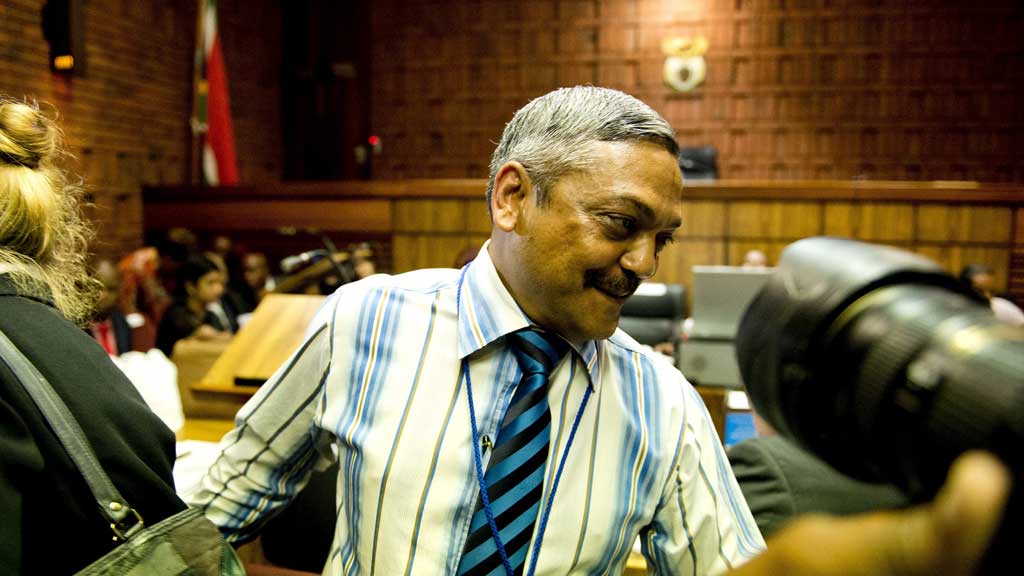Oscar Pistorius murder trial: the main players
South Africa’s biggest trial since apartheid puts a celebrity sportstar in the dock for the murder of his model girlfriend. But the cream of the country’s legal system are also in the spotlight.

Judge: Thokozile Masipa
The fate of the fallen Olympian hero lies in the hands of one person: Judge Thokozile Masipa. She is the only black woman among the other major players in the courtroom – mostly white Afrikaans men – and has a reputation for resolute fairness, often cutting through the theatrical side of courtroom rhetoric.
Her appointment to the trial was apparently approved of by both the defence and the prosecution. But she was also welcomed by women’s rights activists because of her past rulings in cases of violence against women: she sentenced the rapist Shepherd Moyo to 250 years in prison last year, and told a police inspector who had killed his wife: “You deserve to go to jail for life, because you are not a protector: you are a killer.”
A former newspaper reporter, Judge Masipa became a lawyer in her 40s and then went on to become South Africa‘s second black judge 16 years ago.
The trial will be the defining moment of her career so far, putting her judgement – and the entire South African legal justice system – under enormous public scrutiny. A jury system was abolished in South Africa in 1969, but judges are permitted to appoint assessors to help examine all the evidence – something that Judge Masipa has done, although their names have not been made public.
Watch the trial as it happens on the Channel 4 News live-stream
The accused: Oscar Pistorius

Oscar Pistorius was the poster boy of disabled sport – the “fastest man on no legs”, with 20 gold medals under his belt, and charm and style in abundance. Known as the “blade runner”, he was also endorsed by Nike and is still the only Paralympic athlete to have taken part in the Olympics.
When he started dating model and reality TV star Reeva Steenkamp, the double amputee was well on the way to global superstar status. But all that changed last year, when he fired a gun through his bathroom door in the early hours of Valentine’s Day, killing his girlfriend of just a few months.
He said it was a terrible accident: he thought he was shooting an intruder. The prosecution says it was cold-blooded murder.
We already know that he was a gun enthusiast – something the prosecution is attempting use in its case against him. He owned a 9mm Parabellum pistol for self-defence and was applying for licenses for six more guns, including an assault rifle. An on top the murder charges, the prosecution is charging Pistorius with two counts of discharging a weapon in a public place.
The victim: Reeva Steenkamp

Reeva Steenkamp was a South African model who had appeared on the cover of FHM, and was a contestant on the reality TV show Tropika Island of Treasure. But she was also a law graduate, hoping to qualify as a lawyer.
Steenkamp first appeared with Pistorius in public at the South African Sports Awards, and in the following months, had occasionally mentioned him on her Twitter feed: one tweet described the athlete as “beautiful to look at”.
Sarit Tomlinson, from Steenkamp’s management agency Capacity Relations, said she was “the kindest, sweetest human being”. Ms Tomlinson also told ITN: “She was a go-getter. She was enterprising. She was entrepreneurial. And she wanted to succeed in everything that she put her heart and mind to. She was an incredible human being.”
The 29-year-old had been dating Pistorius for three months when he shot her at his home in Pretoria: she died of gunshot wounds to the head and upper body, before paramedics could get her to hospital.
Defence: Barry Roux

Anyone with a fleeting interest in the Pistorius trial will already have formed an impression of the formidable Barry Roux. He questioned the very first state witness across two days, eventually reducing the university professor to tears, as he tried convince her – and the court – of his narrative of events.
Mr Roux is considered South Africa’s best (and most expensive) defence lawyer, and made a name for himself in the cross-examination of police detective Hilton Botha during Pistorius’s bail hearing last year: Botha ended up conceding that nothing could disprove Pistorius’s account of what happened (he was later pulled from the case, after it emerged he faced attempted murder charges) and Roux secured bail for the accused, despite his charge of premeditated murder.
Despite his robust role in court, the lawyer is apparently a private, self-deprecating man, “who likes nothing better than a glass of fine red wine and a really good pizza,” says journalist Debora Patta.
Prosecutor: Gerrie Nel

Pitted against Mr Roux is Gerrie Nel, South Africa‘s award-winning top state prosecutor, who made a name for himself when he managed to convict former Police Chief Jackie Selebie over charges of corruption.
He has built his reputation on holding some the country’s big political players to account and is well known for intensive preparation for court. During Pistorius’s bail hearing last year for example, Nel carefully constructed a picture of a man who was “willing and ready to fire and kill” and of Steenkamp as a cowering, terrified victim, hiding in the toilet before Pistorius shot through the toilet door to kill her.
Mthunzi Mhaga, a former national prosecuting authority spokesman, said of Nel:”everything he touches turns to gold”.
Investigator: Vinesh Moonoo

Lieutenant General Vinesh Moonoo took over the Pistorius case from the disgraced Police Chief Hilton Botha last year, and has been on a mission to salvage the reputation of the police force, and the case, ever since.
The veteran detective will not be called as a prosecution witness, but Moonoo has overseen the entire investigation, along with investigator Mike Van Aardt.
The 53-year-old, who has been in the force for 29 years, has attempted to stay away from the huge media spotlight surrounding the case and has asked for his CV and details not to be released to the public so as to deflect attention away from him.